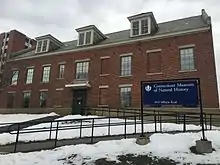| Established | 1985 |
|---|---|
| Location | Storrs, Connecticut, US |
| Type | Natural history museum |
| Director | Janine Caira |
| Website | csmnh |
The Connecticut State Museum of Natural History (CSMNH) is located in Storrs, Connecticut, as part of the University of Connecticut. It was established in 1985 as Connecticut's official natural history museum.
Collections
The museum stewards and preserves a large scope of natural history and archaeological collections from Connecticut and beyond. The natural history collections comprise more than 6,000 objects such as fossils, minerals, shells, and taxidermied insects, birds, and mammals, including the “Pope Mastodon," excavated in 1913 and one of the largest and most complete mastodon skeletons discovered in New England.[1] The museum houses the Office of State Archaeology, which is home to "the largest repository of Connecticut archaeology" in existence, covering one million years of human history and culture.[1][2] Cultural collections include stone tool technology and Native American artifacts and cultural materials from Connecticut.[2]
History
Founded by the University of Connecticut in Storrs in 1982, the museum was established as the State Museum of Natural History in 1985 by state statute.[3] It officially opened to the public that same year.[4] The museum's founding director and the force behind its creation was UConn biology faculty member Carl Rettenmeyer, who led the museum from its founding until his retirement in 1996.[5] The museum moved into its first permanent space in a campus building on Hillside Road in Storrs in 2000.[6]

In August 2016, the University of Connecticut closed the museum's physical spaces on Hillside Road. The building was instead populated with offices of the UConn College of Liberal Arts and Sciences. The editors of The Daily Campus, UConn's student newspaper, criticized the decision, commenting in an editorial that "the concept of a 'museum' without a physical space is stretching what we can define as a museum."[7]
While lacking a centralized exhibit space since 2016, the museum continues to maintain its collections, engage in community outreach and education, and host programs and events. The museum also creates permanent exhibits installed on the UConn campus as well as temporary exhibits that rotate locations.[6][8]
As of 2023, the University of Connecticut’s Institute of the Environment, which has administrative oversight over the Connecticut State Museum of Natural History as well as other university offices, is pursuing a Living Building initiative, with the CSMNH planned as the centerpiece of the new environmental commons.[9]
References
- 1 2 "Collections at the CSMNH". Connecticut State Museum of Natural History. 2021-02-17. Retrieved 2024-01-03.
- 1 2 "About the Connecticut Archaeology Center Collections". Connecticut Archaeology Center. 2008. Archived from the original on 2009-03-08. Retrieved 2008-05-17.
- ↑ "General Statutes of the State of Connecticut, Title 10a, Chapters 185b". Connecticut General Assembly. January 1, 2023. Retrieved 2024-01-03.
- ↑ Battista, Carolyn (1989-05-07). "The View From: The Connecticut State Museum of Natural History; Preserving a Natural Heritage, Here and There". The New York Times. Retrieved 2024-01-03.
- ↑ Gotwald, William H. (September 2009). "In memoriam - Carl W. Rettenmeyer (1931-2009)". Myrmecological News. 12: 250.
- 1 2 Breen, Tom (2016-08-24). "Natural History Museum to Relocate, Expand Public Outreach". UConn Today. Retrieved 2024-01-03.
- ↑ "UConn should honestly address reason behind museum closure". The Daily Campus. 2016-10-04. Retrieved 2024-01-03.
- ↑ "Current Exhibits". Connecticut State Museum of Natural History. 2021-02-17. Retrieved 2024-01-03.
- ↑ "Living Building". UConn Institute of the Environment. 2022-06-23. Retrieved 2024-01-03.
External links
- Connecticut State Museum of Natural History - Official site